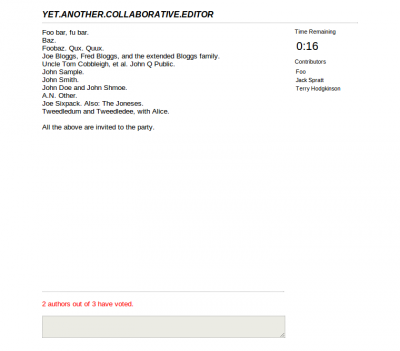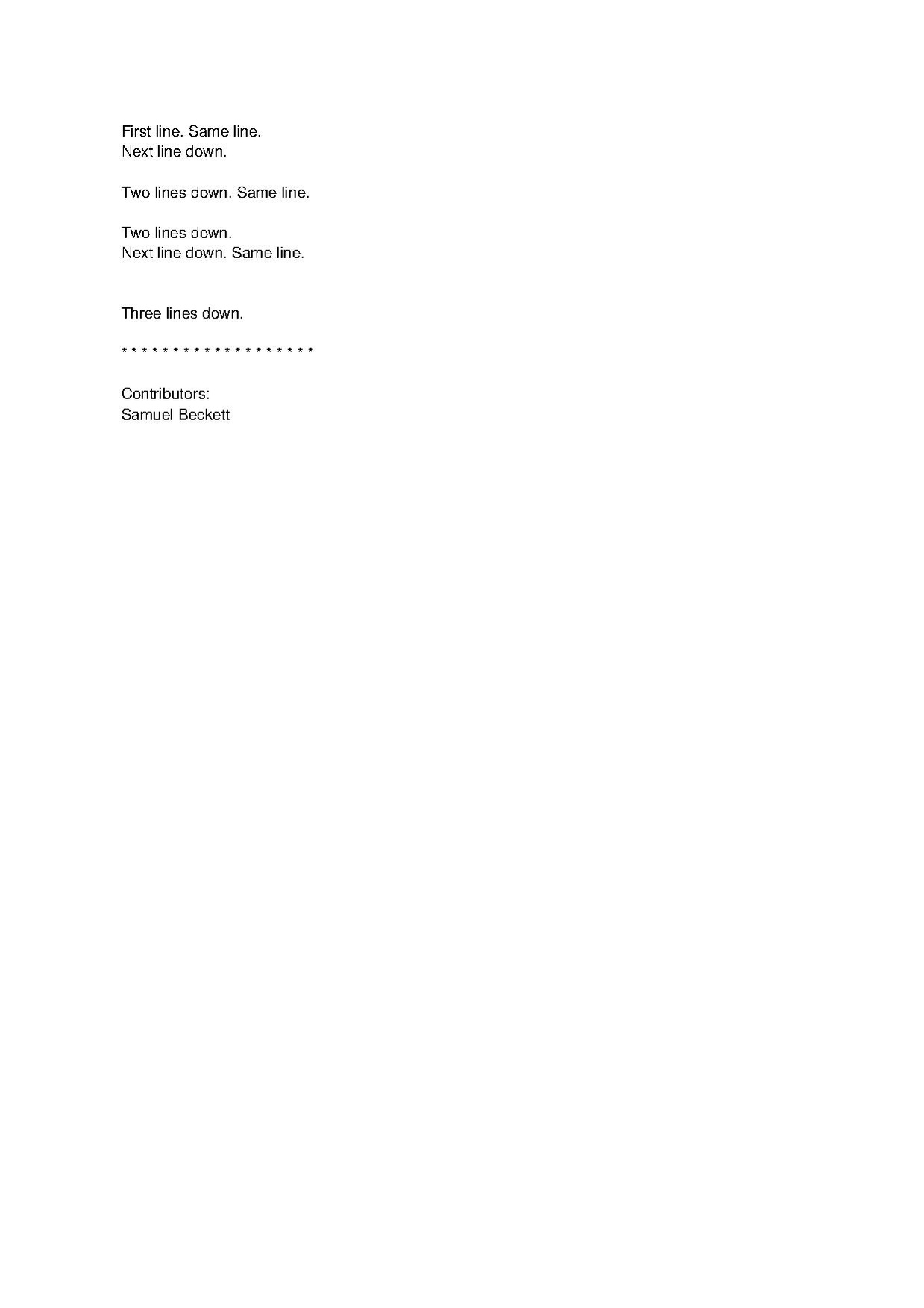Yet Another Collaborative Editor: Difference between revisions
Dave Young (talk | contribs) (→About) |
Dave Young (talk | contribs) (→t0 d0) |
||
| (13 intermediate revisions by the same user not shown) | |||
| Line 1: | Line 1: | ||
==About== | ==About== | ||
[[File:yace.png | | [[File:yace.png | thumb | 400px | A screenshot of ''Yet Another Collaborative Editor'' being used to plan an invite list for an important party.]] | ||
''Yet Another Collaborative Editor'' is a networked text editor that enables a group of authors to write a document together in their web browser. In order to do so, all connected authors must follow a linear process of voting on each new addition to the text before they can continue. On visiting the webpage, the user is invited to become an "author" by entering an author name into a text box. By doing this, their name is added to the list of authors that have contributed to the document. They are also immediately afforded voting rights in the system. The author can submit a new addition to the test, at which point all connected authors will be notified that they must all vote on whether or not they would like this addition to be permanently stored in the text. All connected authors must unanimously vote 'yes' for the addition to be accepted - if one author votes no, the addition is removed. After the voting process is completed, the authors are invited to submit a new addition to the text, and the process continues. There is also a timer that, upon reaching zero, closes the document editing session and makes a pdf of its current state available for download. | ''Yet Another Collaborative Editor'' is a networked text editor that enables a group of authors to write a document together in their web browser. In order to do so, all connected authors must follow a linear process of voting on each new addition to the text before they can continue. | ||
On visiting the webpage, the user is invited to become an "author" by entering an author name into a text box. By doing this, their name is added to the list of authors that have contributed to the document. They are also immediately afforded voting rights in the system. The author can submit a new addition to the test, at which point all connected authors will be notified that they must all vote on whether or not they would like this addition to be permanently stored in the text. All connected authors must unanimously vote 'yes' for the addition to be accepted - if one author votes no, the addition is removed. After the voting process is completed, the authors are invited to submit a new addition to the text, and the process continues. There is also a timer that, upon reaching zero, closes the document editing session and makes a pdf of its current state available for download. | |||
The work is designed to explore the process of collaboration in a creative system, highlighting the tensions between self-interest and collective productivity. ''Yet Another Collaborative Editor'' can be readily exploited by one author who, by constantly voting "no" and refusing additions to the text, can completely halt progress. So, if all authors wish the system to become productive once more, a consensus must be ''emergent'', as there is no secondary chat window where the authors can debate their submissions or voting patterns. | The work is designed to explore the process of collaboration in a creative system, highlighting the tensions between self-interest and collective productivity. ''Yet Another Collaborative Editor'' can be readily exploited by one author who, by constantly voting "no" and refusing additions to the text, can completely halt progress. So, if all authors wish the system to become productive once more, a consensus must be ''emergent'', as there is no secondary chat window where the authors can debate their submissions or voting patterns. | ||
The work is intended to be a creative tool that exposes the tensions in using social systems to maintain a state of hyper-democracy. My interest in this topic stems from research into the various ways in which cybernetics has been used as a method of creating stability in a social system. For example, cybernetics had a great influence on the (supposedly) democratic systems in the communes of California in the 1960s and early 1970s. From a more contemporary perspective, the fundamental concepts of cybernetics now exist as the basis for how we behave on the web - these concepts are now so ubiquitous that they have become invisible reflexes. ''Yet Another Collaborative Editor'' is a jarring disruption of the flows of endless scrolling and dynamic content: the process is readily (and perhaps frustratingly) visible to all participants. | The work is intended to be a creative tool that exposes the tensions in using social systems to maintain a state of hyper-democracy. My interest in this topic stems from research into the various ways in which cybernetics has been used as a method of creating stability in a social system. For example, cybernetics had a great influence on the (supposedly) democratic systems in the communes of California in the 1960s and early 1970s. From a more contemporary perspective, the fundamental concepts of cybernetics now exist as the basis for how we behave on the web - these concepts are now so ubiquitous that they have become invisible reflexes. ''Yet Another Collaborative Editor'' is a jarring disruption of the flows of endless scrolling and dynamic content: the process is readily (and perhaps frustratingly) visible to all participants. | ||
==Use== | |||
<strike>A prototype version of ''Yet Another Collaborative Editor'' is available online [http://pzwart3.wdka.hro.nl/~dyoung/yace/index.html here].</strike> | |||
*Please note that you will get a message indicating that the server is offline unless I am currently running the server script. | |||
*There is a bug with Safari where it cannot open the connection with the server. | |||
*Chromium and Firefox both appear work without any issues (tested on Mac OSX and Debian/Ubuntu). | |||
*When the timer hits '0:00' a pdf will be made available for download. | |||
==t0 d0== | |||
*Use socket.io instead of ws | |||
*New session button on timer runout. | |||
==Samples== | |||
*''' '\n' Test''', by Samuel Beckett (PDF) | |||
:[[File:firstline.pdf]] | |||
Latest revision as of 19:20, 10 December 2012
About
Yet Another Collaborative Editor is a networked text editor that enables a group of authors to write a document together in their web browser. In order to do so, all connected authors must follow a linear process of voting on each new addition to the text before they can continue.
On visiting the webpage, the user is invited to become an "author" by entering an author name into a text box. By doing this, their name is added to the list of authors that have contributed to the document. They are also immediately afforded voting rights in the system. The author can submit a new addition to the test, at which point all connected authors will be notified that they must all vote on whether or not they would like this addition to be permanently stored in the text. All connected authors must unanimously vote 'yes' for the addition to be accepted - if one author votes no, the addition is removed. After the voting process is completed, the authors are invited to submit a new addition to the text, and the process continues. There is also a timer that, upon reaching zero, closes the document editing session and makes a pdf of its current state available for download.
The work is designed to explore the process of collaboration in a creative system, highlighting the tensions between self-interest and collective productivity. Yet Another Collaborative Editor can be readily exploited by one author who, by constantly voting "no" and refusing additions to the text, can completely halt progress. So, if all authors wish the system to become productive once more, a consensus must be emergent, as there is no secondary chat window where the authors can debate their submissions or voting patterns.
The work is intended to be a creative tool that exposes the tensions in using social systems to maintain a state of hyper-democracy. My interest in this topic stems from research into the various ways in which cybernetics has been used as a method of creating stability in a social system. For example, cybernetics had a great influence on the (supposedly) democratic systems in the communes of California in the 1960s and early 1970s. From a more contemporary perspective, the fundamental concepts of cybernetics now exist as the basis for how we behave on the web - these concepts are now so ubiquitous that they have become invisible reflexes. Yet Another Collaborative Editor is a jarring disruption of the flows of endless scrolling and dynamic content: the process is readily (and perhaps frustratingly) visible to all participants.
Use
A prototype version of Yet Another Collaborative Editor is available online here.
- Please note that you will get a message indicating that the server is offline unless I am currently running the server script.
- There is a bug with Safari where it cannot open the connection with the server.
- Chromium and Firefox both appear work without any issues (tested on Mac OSX and Debian/Ubuntu).
- When the timer hits '0:00' a pdf will be made available for download.
t0 d0
- Use socket.io instead of ws
- New session button on timer runout.
Samples
- '\n' Test, by Samuel Beckett (PDF)


